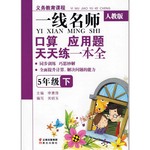题目内容
candy bowl short luck beef and potato
1.--What do you put in your birthday cake。Tony?
--A_______.
2.Ann likes_________noodles.
3.I'd like a small_________of rice.
4.Eggs are a symbol of life and good________.
5.The restaurant is________of fish today.
练习册系列答案
 新课标同步训练系列答案
新课标同步训练系列答案 一线名师口算应用题天天练一本全系列答案
一线名师口算应用题天天练一本全系列答案
相关题目

